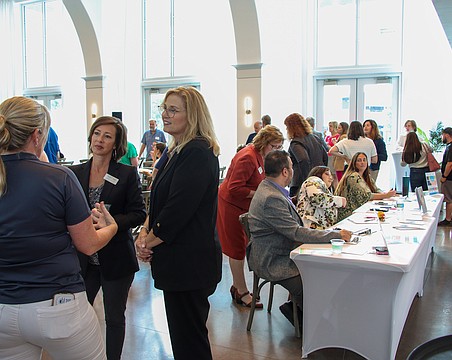Landing the big ones
For more than 30 years, Bruce Erhardt has bought and sold land along the Gulf Coast, paving the way for development and job growth.
COMMERCIAL REAL ESTATE
by Dave Szymanski | Tampa Bay Editor
If it took you six months to two years to make a sale in your business, and if daily events beyond your control affected the price, you would begin to understand the life of commercial land broker Bruce Erhardt.
"At Westshore (Boulevard) and (Interstate) 275 in Tampa, I was negotiating at $11 a square foot," says Erhardt, senior director with Cushman & Wakefield of Florida. "Someone sold land across the street at $20. That changed things."
If you are in the development business, specifically land sales on the Gulf Coast, it is likely you've worked or spoken with Erhardt.
Tall, lean, a Cary Grant with glasses, Erhardt, 59, is a native of South Bend, Ind. He has spent more than 30 years in real estate, selling more than 30,000 acres in Florida for office, retail, hotel, industrial and residential use.
He has done a lot of deals, from Tampa to Fort Myers and along the east coast, including the 10 acres that became the Marriott Waterside Hotel in downtown Tampa, some Bayshore Boulevard condominiums, 700 acres in Tampa Palms and the One Laurel Place office building in Westshore.
So he's seen cycles like the current softness in the market and he's confident the Gulf Coast and its companies will work through it. In fact, that's been the biggest lesson he's learned after 30 years of real estate: How quickly the market tanks. And how quickly it can come back.
"Either through a government law, or financing, what I learned is that I have to be constantly talking to people to know what is going on," Erhardt says. "I need to stay connected to the market. Talking to everybody. In January 2006, the brakes went on. If you are out of town six months, things could be radically different."
How is this market downturn different than previous ones? This time, it is mainly connected to residential overbuilding, not overbuilding in all segments, Erhardt says.
The key to getting out of it will be better job growth, he says. Jobs, not the stock market, are the main indicator Erhardt uses to measure the market.
The key to making deals happen is buyers and sellers doing their homework, being educated on the parcel and being up front with each other, Erhardt says. That information might include the quality of roads, cleanup issues and zoning.
"People buying zoned land go for a building permit and find they have a failing road," he says. "You need to tell all the bad stuff up front, to everybody."
Erhardt remembers when land in Tampa's Westshore business district sold for $10 to $15 a square foot. Now it is up to $30 to $35 and more than $100 on Dale Mabry Highway.
He gets repeat business, but only does 10 to 15 deals a year. Compare that to brokers leasing office space who may be doing 40 to 60 leases a year.
Positive and patient
Erhardt does business on the Gulf Coast because he believes in the market. "Sarasota could be an even better office market," he says. "Opportunities are everywhere. It's just a matter of timing."
The Gulf Coast has a great reputation as a place to live and do business, Erhardt says. The challenge is that now it is competing with other good places to live and work.
That means hard work and patience are needed. Some of Erhardt's properties have taken seven to 10 years to sell. He still represents a client that's been trying to sell since 1993.
Despite the challenges, good deals are still being made, he says.
"I bring people together, inform the buyer and tell the buyer everything I know," Erhardt says. "The seller knows. People will find out the information sooner or later."
Sometimes he not invited to the next meeting between the buyer and seller. Sometimes he is.
"It all varies depending on the nature of the transaction," Erhardt says. "Some people don't go anywhere without me."
Because of the promise of creating a building and the possibility of making money, people are often looking at land, he says.
"Everyone is looking at real estate who has money," Erhardt says. "There's an opportunity to do something at a price where you can have appreciation. But the demand for development is off. We're doing work in apartment land and industrial."
As commercial activity has slowed, brokers are working with school systems, hospitals and investors. Erhardt advises clients that getting land at the right price is crucial.
"For all the investors, you make your money when you buy it," Erhardt says. "You have to do that when buy right, or you have to build your way out of it."
Despite his success, Erhardt has had challenges, too. At one point, his dad had to help him.
"We were coming out of terrible recession in '74 and '75, then in 1978, I didn't know how bad it was," he says. "I thought I had enough money for couple of years to ride it out. I ran out in a year."
Land trends
Right now, there are no extremely popular areas for land sales, because of the economy, Erhardt says.
"It's just like taking a breather," he says. "Nothing's hot, except for the fever for investment guys to strike a deal. An appraiser said he thinks there will be a lot of land trades in the next three years. That would mean a classic reshuffling of the deck. Guys in, guys out."
One trend Erhardt is a little more certain of is more affordable urban housing because of higher fuel costs. Developers will want to get people closer to where they work.
"For the money you may or may not save on the mortgage, living close will be worth it," he says.
Erhardt is looking for the real estate market to return to full health in Florida in 2010 or 2011.
The Wiregrass mixed-use development in southern Pasco, with 5,000 acres, will be one of the biggest real estate projects in Florida and one to watch.
But at the same time big new developments on vacant land rise from the ground, the infill trend - using smaller parcels for development in developed areas - will continue, Erhardt says.
"Infill is in," he says. "Redevelopment will continue."
South Hillsborough County, in the office and medical office market, is an area to watch in land sales as well as the Port Manatee area.
A quiet competitor
"He's a formidable competitor," says Bill Eshenbaugh, president of the Eshenbaugh Land Co. in Tampa.
Eshenbaugh has cooperated with Erhardt on some deals. Sometimes they've been on opposite sides, one representing the seller, the other, the buyer.
"You know when you do business with Bruce, he gets to the bottom line and he knows what needs to be done to represent his client," Eshenbaugh says.
Erhardt had a buyer looking for an apartment site and called Eshenbaugh, who gave him a site idea. A month later, Erhardt FedExed Eshenbaugh a written contract, offering him a share of the commission.
"I don't know that I had an expectation for him to put me in," Eshenbaugh says.
Erhardt's boss, Larry Richey, senior managing director for Cushman, says Erhardt has a reputation for being the best at what he does in Florida. "But despite his success, he is a humble guy that enjoys what he does and tries to help someone, anyone," Richey says.
For example, for years, Erhardt served the Big Brother, Big Sister organization, Richey says.
"He's not just about his business, and certainly not about Bruce," Richey says. "He's not a salesman. He tells you like it is. He smiles and goes about his business. He'll tell you anything. The point is, he loves what he does.
"For a lot of brokers, it's about the commission, about closing the deal," Richey says. "That's not everything to Bruce. He has a great heart and cares about people."
Family issues
One of the most significant issues for Erhardt has been his family. At 51, he ended his bachelorhood and got married to Cathy, a woman he met through a friend.
He now has two children, ages 5 and 7, and continues to live in South Tampa. The family is building a small vacation home on Little Gasparilla Island, near Boca Grande, where they like to fish.
"I still work weekends," Erhardt says. "I used to work late during the week and always weekends."
On the whole, over 30 years, a lot about his job hasn't changed. People want to sell or buy land. Erhardt has to search for a site, or research the property. What has changed are government regulations. Relationships with clients are still important.
On his desk high above downtown Tampa are four stacks of papers, including many maps and aerial photographs. There are new listings and other documents. This night, he's trying to work through one pile. It's about 7 p.m.
"You have to gather a lot of crap to learn about a property," Erhardt says.
REVIEW SUMMARY
Company: Cushman & Wakefield of Florida
Industry: Commercial real estate brokerage
Key: The real estate market can drop fast, but can recover just as quickly.





